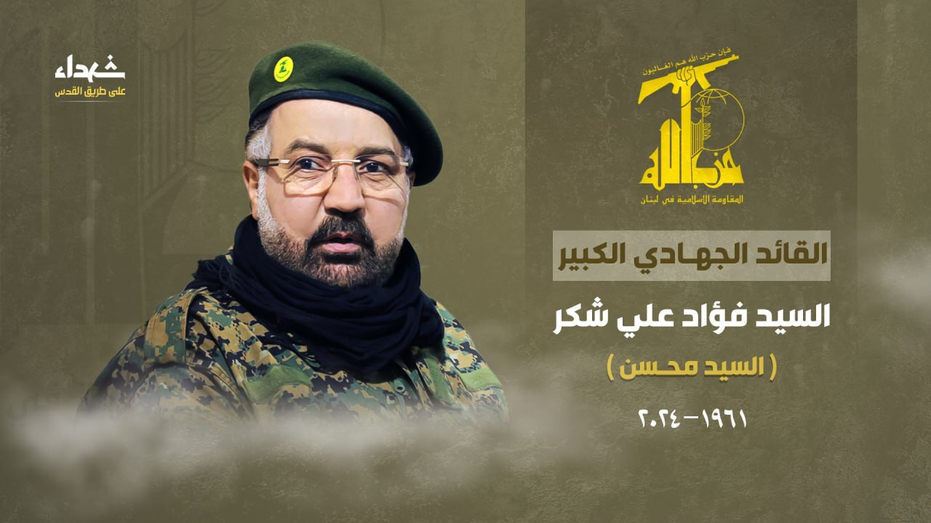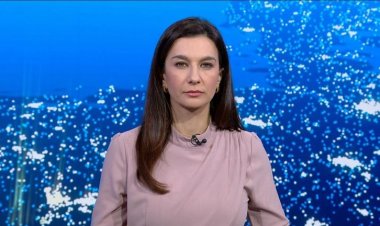Hezbollah confirms death of commander, arch-terrorist who killed Marines, Israelis over decades
Hezbollah confirmed Fuad Shukr's death 24 hours after the IDF claimed to have killed him in a strike on Beirut, and the State Department revealed he likely succumbed to injuries.

Hezbollah confirmed the death of its "No. 2" commander, a man with a history that includes helping orchestrate one of the deadliest days for the U.S. Marine Corps in history, after an IDF strike on Beirut.
"The latest information out of Beirut suggests that he did succumb to his injuries after being taken to a hospital for treatment," Deputy State Department Spokesperson Vedant Patel told reporters at a briefing Wednesday. "Let's also remember that this was an individual who was involved in the 1983 U.S. Marine barracks bombing and certainly has American blood on his hands."
Fuad Shukr had a $5 million bounty on his head for his involvement in the 1983 Beirut bombings of a Marine barracks, which killed 241 U.S. military personnel and wounded 128 others. The Israeli Defense Forces (IDF) announced its strike had killed Shukr, but Hezbollah initially did not confirm his death, saying only that he was present in the building that the IDF destroyed with its strike.
One day after that, Hezbollah confirmed Shukr’s death on the group’s Telegram account, adding that its leader, Hassan Nasrallah, will make a public address at Shukr’s funeral Thursday.
"Shukr had American and Israeli blood on his hands. This cannot be ignored," Behnam Ben Taleblu, a senior fellow at the Foundation for Defense of Democracies, told Fox News Digital. "Shukr was a bit of an everything man for Hezbollah — a terrorist, an engineer, an intelligence officer and obviously a believer in the group’s anti-Israel and anti-American cause.
"The strike is designed to handicap, not destroy Lebanese Hezbollah," Taleblu added. "This raises the operating price for the Iran-backed terror group in Lebanon."
The IDF strike served as a response to an attack over the weekend that killed a dozen youths in Israel's Golan Heights, but Hezbollah continues to deny any involvement in that attack, while the IDF identified Shukr as the mastermind behind the attack.
Israeli Defense Minister Yoav Gallant applauded Shukr’s death, saying his death proved "the blood of our people has a price, and that there is no place out of reach for our forces to this end." Shukr’s death marks the most senior Hezbollah death in nearly a year.
The IDF strike reportedly killed a woman and two children, Reuters reported Tuesday, citing medical and security sources.
The U.S. State Department issued a level 4 "Do Not Travel" advisory for Lebanon, citing "rising tensions between Hezbollah and Israel," adding Americans who are already in Lebanon should "be prepared to shelter in place should the situation deteriorate."
"The U.S. Embassy strongly encourages U.S. citizens who are already in Southern Lebanon, near the borders with Syria, and/or in refugee settlements to depart," the advisory added.
The United Nations warned against further escalation between the two sides, citing a need to focus on retrieving the hostages and increasing humanitarian aid in Gaza, which could be facilitated by "a return to calm in Lebanon and across the Blue Line."
"Rather than that, what we are seeing are efforts to undermine these goals," Stéphane Dujarric, press secretary for U.N. Secretary-General Antonio Guterres, said in a press release. "The Secretary-General has consistently called for maximum restraint by all. It is increasingly clear, however, that restraint alone is insufficient at this extremely sensitive time.
"The Secretary-General urges all to vigorously work towards regional de-escalation in the interest of long-term peace and stability for all," Dujarric added. "The international community must work together to urgently prevent any actions that could push the entire Middle East over the edge, with a devastating impact on civilians."






















